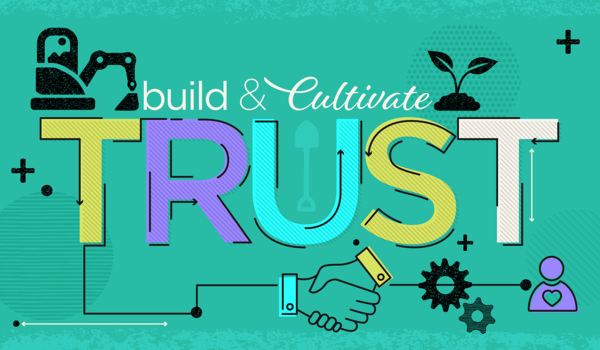Top 3 Reasons You Need to Build A Strong Pharmacist-Customer Relationship

Merriam-Webster defines trust as a “reliance on the character, ability, strength, or truth of someone or something in which confidence is placed.”
Independent, local, or community pharmacies must create confidence in the communities they serve if they want their customers to look to them as reliable, having a strong character, and deserving of trust.
But trust doesn’t come easy, it needs to be built and cultivated.
A pharmacist’s relationships with their customers play a defining role in how their pharmacy is perceived as a valuable resource and accessed by the community it serves, resulting in a stronger footprint in the community and a more profitable and relevant business.
It is for these reasons that we thought it might be helpful to review the top 3 reasons pharmacists need to build a strong relationship with their customers, and how they might begin constructing that foundation.
1. Customers Care About Customer Service

Step back and take a moment to assess your customer service. Are you taking the time to listen to your customers? Is your staff? Can you show empathy and concern while addressing your patient’s needs? Are you doing so with courtesy and professionalism?
These are all huge players in a customer’s reason for visiting and remaining loyal to an independent pharmacy.
Some things you can do to sharpen your pharmacy’s customer service focus include:
Be sure to address your customer by name
Listen – and listen closely
Educate and train your staff and insist that customer service be a primary goal
When counseling patients, practice the “teach back method” to ensure they understand everything they need to know in order to have the best possible outcomes
2. Customers Want to be More Than a Sale
Having a competitive price is important, but customers are also (generally) willing to pay a little extra or spend a little extra time going out of their way to visit a stand-alone pharmacy, if they feel they’re going to be treated as a person and not another “sale”.
Your ability to effectively deliver valuable customer service (as outlined above) will tie directly into your ability to demonstrate your customers’ value to your establishment.
Value goes both ways. When a pharmacist and their team acknowledge that the customer is also a part of that “team”, dynamic, stronger relationships are built, trust is built, and a mutually beneficial relationship result. Everyone wins.

3. A Proactive Approach to Customer/Patient Outcomes Makes for Proactive Customers/Patients
Pharmacists are best known for their ability to dispense medications. But the role of the pharmacist is changing with new guidelines tied to better customer outcomes. Pharmacists — through counseling, medication therapy management (MTM), disease-state management, and other means — have expanded their roles in patient care. And that expansion provides many opportunities to improve a patient’s healthcare outcomes. If pharmacists embrace this change and present a proactive attitude toward their patients’ care, this will further strengthen the customer relationship.
Some ways a pharmacist can be proactive in a customer’s health outcomes include:
- Recognizing why a customer might not adhere to patient medication schedules (can be learned through effective customer service for example) – this is where the “teach back method” can come in handy.
- Using that knowledge to conduct adherence-check phone calls. For example, contacting patients after a sufficient amount of time (three to four days after a seven-day antibiotic regimen, for example) has passed, when they may be showing improvement and be more susceptible to discontinuing their medication, can be an extremely effective way to show the customer that they’re a person first, and their health and improvement matters to you even after the “sale” is made.
- Offering free blood pressure checks, blood sugar management discussion groups, weight management groups, or other chronic conditions, can also solidify a customer’s belief that they’ve made the right choice in choosing a smaller, local pharmacy – because your establishment is considering all their needs and putting their healthcare first.
When pharmacies go out of their way to show a patient they matter, they’re increasing the likelihood that their patient will also be proactive in driving friends and relatives to their establishment.
Closing Thoughts
Owning and running a profitable and relevant community-based business requires a proprietor to become an integral and trusted member of the community they serve – and pharmacies/pharmacists are not exempt from that requirement.
Fortunately for the independent pharmacist, there are many ways to build strong customer relationships that can help make the foundation of their business stronger and result in a venture that is both financially profitable for the pharmacists, and highly beneficial for current (and potential) customers.
Has your pharmacy put a strong emphasis on building customer relationships? Have you found a customer service/engagement technique particularly helpful? How has your pharmacy benefited –– or not –– from utilizing customer focused strategies?
We’d love to know and may even share those experiences in future blog posts, white papers, and e-books. If you’d like to add your experience, please contact Jessica Gardner.
And, of course, be sure to subscribe to our blog for more tips, insights and bulletins that can help grow your pharmacy and save you money – all from your partners at AlliantRx.
Sources:
https://www.merriam-webster.com/dictionary/trust
https://www.uspharmacist.com/article/the-pharmacists-role-in-medication-adherence
https://www.ahrq.gov/professionals/quality-patient-safety/quality-resources/tools/literacy-toolkit/healthlittoolkit2-tool5.html
